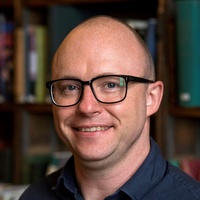
Lecturer
- About
-
- Office Address
- School/Department
- School of Medicine, Medical Sciences and Nutrition
Biography
I studied biomedical sciences at the University of Aberdeen before completing a PhD at the University of Bristol. Following this, I moved to the University of Edinburgh to work in the lab of Prof. Matt Nolan where I studied the cellular and circuit properties that underlie spatial navigation and learned behaviours. I was appointed as a lecturer at the University of Aberdeen in September 2022.
My research focuses on trying to understand changes in the brain in autistic spectrum disorder (ASD). Specifically, I want to investigate whether the large number of genes linked to ASD converge on common pathways and pathologies. My lab will do this using a combination of ex-vivo electrophysiology and advanced microscopy techniques, to test for convergence in physiological and/or morphological changes in neurons across several monogenic ASD models. Following on from this I will then aim to determine whether there are critical periods during which these changes can be reversed. This will increase our understanding of how ASD-related genes regulate neuronal function and potentially allow for the development of interventions and treatments for ASD patients.
- Research
-
Research Overview
A large number of genes are associated with autism spectrum disorders (ASDs), yet little is known as to whether there is a convergence of these genes to a smaller number of phenotypic neuropathologies. My lab aims to develop a new model system to study ASDs, using neurons of the inferior olive (IO). IO neurons express the majority of ASD genes, are a 99.9% homogenous population, have elaborate dendritic spines, and easily quantifiable postsynaptic responses to afferent input. Initial experiments suggest that IO neurons display convergent phenotypes across three ASD models: Fmr1-/y, Syngap1+/- and Nlgn3-/y.
My lab aims to elucidate the mechanisms underlying convergent ASD phenotypes in IO, with the aim of subsequently reversing the changes observed in ASD models. To address this my lab will combine optogenetic approaches and advanced imaging methods to 1) Determine whether the increase in excitability in IO across ASD models is due to a functional change in ion channels or signalling pathways. 2) Determine if there are morphological changes at the level of the spine using super-resolution microscopy. 3) Determine the molecular mechanisms underlying the changes observed. 4) Determine whether ID/ASD phenotypes in IO can be reversed using pharmacological or viral knock-in or knock-down approaches. 5) Determine if there is a critical period during which ID/ASD model pathologies can be reversed.
Through these objectives, my lab will seek to determine whether there are convergent phenotypes across ASD models and whether there are critical periods during which these can be reversed. This will increase our understanding of how ASD-related genes regulate neuronal function and potentially allow for the development of interventions and treatments for ASD patients.
Research Areas
Accepting PhDs
I am currently accepting PhDs in Biomedical Sciences.
Please get in touch if you would like to discuss your research ideas further.
Biomedical Sciences
Accepting PhDsResearch Specialisms
- Biomedical Sciences
- Developmental Biology
- Neuroscience
- Physiology
Our research specialisms are based on the Higher Education Classification of Subjects (HECoS) which is HESA open data, published under the Creative Commons Attribution 4.0 International licence.
- Teaching
-
- Publications
-
Page 1 of 2 Results 1 to 10 of 16
Synaptic interactions between stellate cells and parvalbumin interneurons in layer 2 of the medial entorhinal cortex are organized at the scale of grid cell clusters
eLife, vol. 12Contributions to Journals: Articles- [ONLINE] DOI: https://doi.org/10.7554/eLife.92854
- [OPEN ACCESS] http://aura.abdn.ac.uk/bitstreams/a798a9ef-45ff-4605-be9b-9457ad3ed072/download
- [ONLINE] View publication in Scopus
Synaptic interactions between stellate cells and parvalbumin interneurons in layer 2 of the medial entorhinal cortex are organized at the scale of grid cell clusters
Working Papers: Preprint Papers- [ONLINE] DOI: https://doi.org/10.7554/eLife.92854.3
Fan cells in lateral entorhinal cortex directly influence medial entorhinal cortex through synaptic connections in layer 1
eLife, vol. 11, e83008Contributions to Journals: ArticlesInter- and intra-animal variation in the integrative properties of stellate cells in the medial entorhinal cortex
eLife, vol. 9, e52258Contributions to Journals: Articles- [ONLINE] DOI: https://doi.org/10.7554/eLife.52258
- [OPEN ACCESS] http://aura.abdn.ac.uk/bitstreams/194d7f41-6f61-4e0a-9256-e3fe161b5493/download
- [ONLINE] View publication in Scopus
Fan Cells in Layer 2 of the Lateral Entorhinal Cortex Are Critical for Episodic-like Memory
Current Biology, vol. 30, no. 1, pp. 169-175.e5Contributions to Journals: Articles- [ONLINE] DOI: https://doi.org/10.1016/j.cub.2019.11.027
- [OPEN ACCESS] http://aura.abdn.ac.uk/bitstreams/b1a0eb9c-c23a-435e-a000-90525a1e3006/download
- [ONLINE] View publication in Scopus
Fan cells in layer 2 of lateral entorhinal cortex are critical for episodic-like memory
Working Papers: Preprint Papers- [ONLINE] DOI: https://doi.org/10.1101/543777
- [ONLINE] View publication in Scopus
Inter- And intra-animal variation of integrative properties of stellate cells in the medial entorhinal cortex
Working Papers: Preprint Papers- [ONLINE] DOI: https://doi.org/10.1101/678565
- [ONLINE] View publication in Scopus
Inferior Olive HCN1 Channels Coordinate Synaptic Integration and Complex Spike Timing
Cell Reports, vol. 22, no. 7, pp. 1722-1733Contributions to Journals: ArticlesStellate Cells in the Medial Entorhinal Cortex Are Required for Spatial Learning
Cell Reports, vol. 22, no. 5, pp. 1313-1324Contributions to Journals: ArticlesActive integration of glutamatergic input to the inferior olive generates bidirectional postsynaptic potentials
Journal of Physiology, vol. 595, no. 4, pp. 1239-1251Contributions to Journals: Articles- [ONLINE] DOI: https://doi.org/10.1113/JP273424
- [ONLINE] View publication in Scopus
